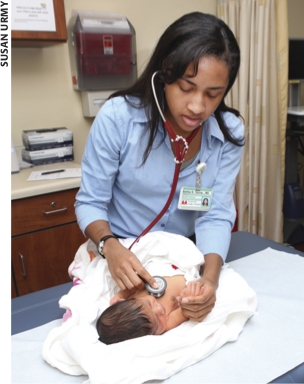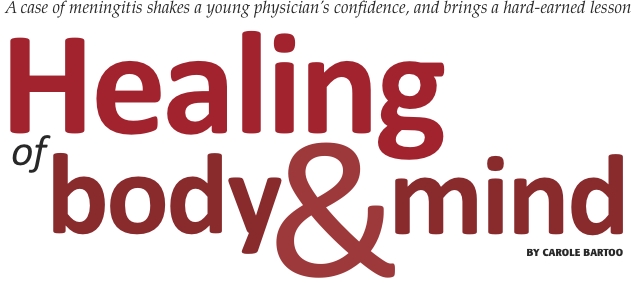Healing of body, and mind
Ashley Tauriac, M.D., invested four years of her life, and miles of neurons to learn the practice of medicine. Then she nearly lost it all.
On Friday, May 14, 2010, she graduated from Vanderbilt University School of Medicine, feeling a bit feverish during the ceremony. By the Monday after her graduation, Tauriac developed a headache so severe, she called a cab to take her three blocks to the Emergency room at Vanderbilt.
The diagnosis—meningitis—seemed ridiculous to her.
“It doesn’t happen a lot, I was not living in a dorm, I had no exposures, I was vaccinated. It just didn’t make sense,” she said.
The two weeks that followed were frightening for her friends and family as her condition worsened, evolving into pneumonia before the antibiotics finally gained control and turned the infection around. But Tauriac says recovery is what has shaken her the most.
The next year would be a journey through physical, and then excruciatingly difficult mental recovery; an experience she says taught her a great deal she had never learned in school.
Missing time
In bacterial meningitis the tender covering of the brain and spinal cord is painfully inflamed. Antibiotics can successfully treat the illness, but the swelling and inflammation can leave damage that cannot be detected by any medical scan or test. By the time Tauriac began to return from a semi-stupourous state, medical tests indicated she was recovering fully, but she knew otherwise.

“I remember looking at the sign in the room that had the date, and it said May 25, I thought, ‘May 25th! I missed something,” Tauriac said.
In fact, her memory of the whole month of May went missing for an alarming length of time. At first she could recall nothing at all from graduation. Friends had to show her pictures to prove she had been there.
Tauriac’s good friend and classmate, Miranda Raines, had been checking in frequently by text and phone.
“Early on she made sense, but four to five days into it, she wasn’t like herself at all,” Raines recalled.
Raines and Tauriac had both matched for pediatric residency at Vanderbilt, and it was to begin six weeks after graduation. Raines said even as Tauriac left the hospital, cleared of her infection, she wasn’t back to normal.
“Her voice changed. People have a certain cadence to their speaking voice. Hers was gone. There were long pauses in conversation and her voice was flat, no musical tones,” Raines said.
Tauriac had essentially suffered a brain injury. As she worked to build her physical strength back, she found her mental endurance was surprisingly low—even reading was exhausting.
“I was worried. I went to a boot camp (residency preparation lab) in June and I wasn’t thinking very quickly, my memory was still poor,” Tauriac recalled.
She talked with her chief residents and the residency director, Rebecca Swan, M.D., about her concerns. It seemed as if she had to pull information out of her brain with great difficulty. Tauriac said she felt compelled to check and recheck her own work, sometimes three or more times when she made medical decisions. Her confidence was shaky at best.
Swan said her heart went out to this young student whom she and others at Vanderbilt knew to be a bright and accomplished student. She allowed Tauriac to pull out of residency for six weeks for medical reasons.
“Physicians have high expectations of themselves anyway and it was very challenging for Ashley. We talked about how she did probably need to back off, so she took time off and she committed herself to working on recovery,” Swan said.
“It was bad. I was being hard on myself,” Tauriac said of that difficult time.
Her friends were worried.
“Her mental capacities were better, but emotionally she was down. You invest all that time and money in learning, then you lose that, even for a short period, it’s scary. That’s the commodity you have after medical school—your brain,” Raines said.
A different doctor, now
Over the six-week rest period, Ashley did what came naturally. She worked hard. She studied to build her mental endurance back up. She began to research what happens to the brain after a bout of meningitis.
“I learned they don‘t do a lot of research. They have looked a bit at the specific bugs and the impact of age at the time of infection, but that’s about it,” Tauriac said.
Tauriac returned to residency, and recently completed her first year. She’s even back to fiddle playing and singing bluegrass. She says it has been very difficult, but she has learned to adapt. She allows herself to slow down a bit, and even quit wearing a watch. Each day gets a little better.
Swan says in her own personal memory, Tauriac has worked through something no other resident has.
“I met with her recently and told her she doesn’t know how proud I am and how much she has accomplished,” Swan said.
Tauriac says she is a different doctor than she would have been, especially when she discharges patients.
“I learned we don’t have to just smile and say ‘Hey you are better, great!’ and send people on their way,” Tauriac said. Instead, she says she’ll spend 20 minutes with patients at discharge if they need it, answering questions about what comes next, explaining healing is a transition, not an end, to illness.
Tauriac understands that now.

Leave a Response